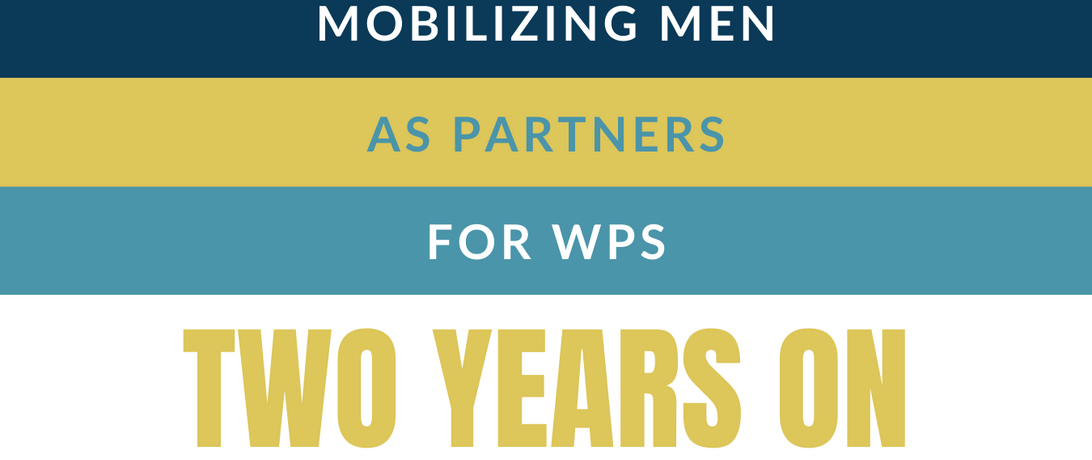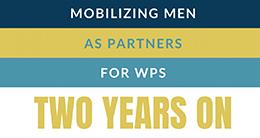
OSF’s Project Mobilizing Men as Partners for WPS has turned 2! Check out some of the highlights!
Our Project, Mobilizing Men as Partners for Women, Peace and Security, recently celebrated its second anniversary under the leadership of Ambassador Donald Steinberg. Below is a letter he wrote to highlight the work that has been accomplished and our goals moving forward. Our Secure Future is excited to continue our work and continue moving the needle forward toward gender equality.
Friends and Partners of MAWPS:
Mobilizing Men as Partners for Women, Peace and Security (MAWPS) was launched two years ago on March 20, 2019. With the outstanding support of Our Secure Future, Strategy for Humanity, and the International Peace Institute, MAWPS brought together 100 institutions and individuals committed to enhancing women's roles in international security issues and peace operations. At its launch, MAWPS adopted a charter and statement of principles that guided a two-year work program with four priorities. We wanted to take this opportunity to thank you all for your dedicated support during this period and to provide an update on the activities over the past two years.
First, MAWPS sought to help open doors of peace processes for women and women’s organizations, especially from grassroots groups. Second, it worked to strengthen and empower women’s organizations in conflict-affected countries. Third, it sought to hold governments, international organizations, and other actors accountable for their commitments to support, empower, and protect the rights of women in the context of armed conflicts and population displacement. Finally, MAWPS worked to expand the community of practice around WPS, especially by urging men from the diplomatic, defense, and development arenas to serve as facilitators of women’s leadership and engagement.
Facilitate Women's Engagement in Peace Process
MAWPS used the connections and influence of prominent women and men in the global security community to open doors at on-going peace processes to grassroots women. We identified five specific processes: (a) ethno-linguistic tensions in Cameroon; (b) threats to Syrian and Iraqi Kurds in the wake of the Turkish intervention into northern Syria; (c) negotiations involving the Afghanistan government and the Taliban; (d) civil conflict in South Sudan; and (e) ethnic and religious crises in northern Nigeria. In each case, MAWPS established contact with key actors on the ground beginning in 2019 and got a clear sense of what these groups wanted in terms of support. In keeping with our basic principles, women on the ground determined the assistance they wanted. For example, Syrian Kurdish women sought direct access to United Nations and U.S. government policy makers to influence the global response to the crisis that occurred when President Trump withdrew American forces on the border of Turkey and the Kurdish area of Syria. In this case, we helped facilitate meetings for the Syrian Democratic Council in New York and elsewhere with UN officials, diplomats, UN Security Council members, the US government, the New York Times, and key civil society actors. Similarly, MAWPS worked with the leadership of the Southwest/Northwest Women’s Task Force in Cameroon to support their participation in the International Conference on Cameroon. MAWPS also supported sensitive engagement by women in Afghanistan, South Sudan, and northern Nigeria to get their views reflected in international and regional negotiations.
The anticipated model for this activity – facilitating travel of women to key capitals and negotiation sites – was deeply impacted by the global travel lockdown in response to Covid-19. Face-to-face sessions were no longer possible as of March 2020, and the sensitive nature of consultations and importance of personal advocacy precluded using open forms of communication. As a result, MAWPS increasingly focused on its second priority: strengthening women’s organizations on the ground.
Support for Grassroots Women’s Organization in Conflict Countries
Drawing on the knowledge and experience of key advisors, MAWPS identified civil society groups in 17 conflict-affected countries with established records of leadership, integrity, and superior performance. The criteria used to select these organizations was admittedly loose, but our advisory team’s nominations were carefully vetted by MAWPS and Strategy for Humanity. In many cases, organizations had already received awards from the United Nations, donor countries, and international NGOs; in others, the groups had flown beneath the radar.
Given the challenges of the past year, MAWPS focused on groups working at the nexus of gender rights, health, conflict, and displacement, and provided support through “Distinguished Partners for Women, Peace and Security Awards.” The recipients also received small financial awards to be used in whatever way the organizations determined. These unrestricted awards complied with U.S. and international regulations regarding vetting, but otherwise trusted local organizations to use the resources wisely. A number of our awardees have noted that the prestige associated with the award provided access to resources from other donors and/or protection from malign actions by political actors or repressive governments. Examples of the work sponsored by these awards are available on the blog on the Our Secure Future website.
Seven of these NGOs are in Africa: Semerara Youth Coalition Against Gender-Based Violence (Burundi); Southwest/Northwest Women’s Task Force (Cameroon); West African Network for Peacebuilding (Côte d’Ivoire); Enlightening and Empowering People with Disabilities in Africa (Ghana); Mwada-Gana Foundation (Nigeria); EVE Organization for Women’s Development (South Sudan); and COBURWAS International Youth Organization to Transform Africa (Uganda). Four are in Latin America: Breeze of Hope (Bolivia); Voices of Migrants (Colombia); Asociación Pop No’j (Guatemala) and Los Desaparecidos de Iguala (Mexico). Three are in the Middle East: Al-Firdaws Society (Iraq); Arab Women’s Organization (Jordan); and Collective for Research and Training on Development Action (Lebanon). Three are in Asia: Women’s Peace Organization (Afghanistan); Himalayan Health Care (Nepal); and Association of War-Affected Women (Sri Lanka).
Accountability for Commitments to WPS
Our work in holding governments, international organizations, and others accountable for their commitments to empower and protect women faced with armed conflicts and population displacement took place through public outlets. MAWPS team members participated in more 35 conferences, seminars, and interviews addressing implementation of UN Security Council Resolution 1325 and related National Action Plans; the mandate of UN peacekeeping missions in Africa and the Middle East; the US Women, Peace and Security Act of 2017 and the Global Fragility Act of 2019; the European Union Gender Action Plan; and civil society commitments by InterAction, Bond, and other umbrella organizations.
Partners for these presentations included the President of the United Nations General Assembly; US Institute of Peace; Georgetown Institute for Women, Peace and Security; McCain Institute for International Leadership; Women’s Refugee Commission; InterAction; US Department of State and Agency for International Development; International Peace Institute; Global Governance Forum; Stimson Center; Center for Strategic and International Studies; Atrocity Prevention Study Group; Canadian Ministry of Foreign Affairs; American Society for International Law; German Ministry of International Cooperation; Brookings Institution; and the Council on Foreign Relations.
With coalition partners, MAWPS focused in particular on US government actions to comply with the Women, Peace and Security Act of 2017. MAWPS team members took part at the request of the National Security Council, Department of State, Department of Defense and USAID in preparatory sessions for the drafting of the Administration’s implementation plan for the WPS Act of 2017 and submitted written recommendations for the plan. While these were useful activities, the ultimate product produced by the White House was deeply disappointing in many ways. In response, MAWPS produced a series of op-eds and journal articles calling for improvements. A principal outlet for this advocacy was New York University’s influential e-journal, Just Security. Among the articles we published there were:
-
Act Now to Celebrate the UN Women, Peace and Security Agenda in 2020, (August 2019);
-
Men as Partners for Women, Peace and Security: Vital Lessons, (January 2020);
-
What a Feminist Approach to Fighting Covid-19 Might Have Achieved, (May 2020); and
-
Trump Administration’s Women, Peace and Security Plans: Blueprint for Action or Empty Promises? (July 2020)
Community of Practice
From our original base of 100 individuals and organizations, we have expanded over the past two years to more than 250 recipients on our distribution list. Many new members are female leaders from conflict-affected countries who came to MAWPS in response to our keynote address at the Department of State’s International Visitors Leadership Program on Women in Peace and Security in February 2020, which brought together nearly one hundred women peacemakers from 60 countries. Another key source of new members was our role on the leadership council of the German Action Network on Displaced Women, which brings together grassroots women from dozens of conflict-affected countries. We have also linked to the Men Engage Alliance; the United Nations He-for-She network and Male Ally partnership; and the International Civil Society Action Network (ICAN). Other participants learned of our work through the Harvard Business Review book, Good Guys, which cited our guiding principles as models for male support for female empowerment. A key tool in building the network has been our landing page on Our Secure Future’s website. In addition to the MAWPS Charter and Statement of Principles, resources available on that site include:
-
Male Allies for WPS Interview Series, featuring discussions with Ambassador Anwarul Chowdhury, former Under-Secretary-General and High Representative of the United Nations; Mirsad Jacevic, Fellow, Our Secure Future; Dean Peacock, Director, Women’s International League for Peace and Freedom; and Fikiri Nzoyisenga, Founder/Executive Director of Youth Coalition Against Gender-based Violence - SEMERERA, Burundi.
-
Distinguished Partners for WPS, featuring descriptions of and interviews with several MAWPS awardees, including Southwest/Northwest Women’s Task Force (Cameroon); West Africa Network for Peacebuilding (Côte d’Ivoire); Al-Firdaws Society (Iraq); Los Desaparecidos de Iguala (Mexico); Association of War-Affected Women (Sri Lanka); and EVE Organization for Women’s Development (South Sudan); as well as a tribute to Maeve Kennedy Townsend McKean, in whose honor the 2020 awards have been given.
-
MAWPS Launch Videos at International Peace Institute and US Institute for Peace, with presentations from UN Under-Secretary General Ana Maria Menendez; former UN High Representative Anwarul Chowdhury; Security Council Report Executive Director Karin Landgren; Our Secure Future Director Sahana Dharmapuri; Congressman Ed Royce; ICAN Executive Director Sanam Anderlini; and former U.S. Ambassadors Melanne Verveer, Swanee Hunt, Steve McGann, and Frederick Barton.
Looking Back and Ahead
The work described above would not have been possible without your tremendous support, guidance, and dedication. We also wish to thank the leadership and staff members of Our Secure Future and Strategy for Humanity, past and present. We are deeply grateful to Cynda Collins Arsenault, Erin Cooper, Miki Jacevic, Steve McGann, Larry Sampler, Jolynn Shoemaker and Lexie Van Buskirk at Our Secure Future; and Charles Brown, Kelly Case and Sapna Considine at Strategy for Humanity.
The Guiding Principles adopted at the outset of the program stated: “This initiative is a two-year effort running through the end of 2020, at which point the participants will determine what is the best course of action moving ahead.” The achievements of this project and the groundwork laid for even greater progress despite the challenges of 2020 give us encouragement to continue the effort for at least an additional year. We have initiated the process of identifying additional activities and goals for the forthcoming year and will be in contact with you to solicit your input for our “Strategy for Humanity Workplan for Mobilizing Men as Partners for Women, Peace and Security, 2021,” which outlines projected activities and goals for the forthcoming year.
With deepest thanks for your continued engagement,
Donald Steinberg
Executive Director
Mobilizing Men as Partners for Women, Peace and Security
Sahana Dharmapuri
Director
Our Secure Future - a program of One Earth Future
Alexandra Arriaga
Founder and Partner
Strategy for Humanity
 Download Mobilizing Men as Partners for WPS Two Years On as a PDF
Download Mobilizing Men as Partners for WPS Two Years On as a PDF